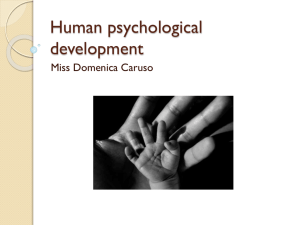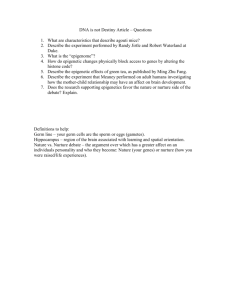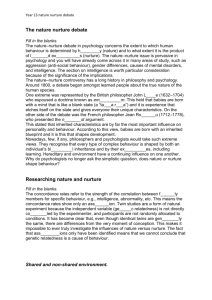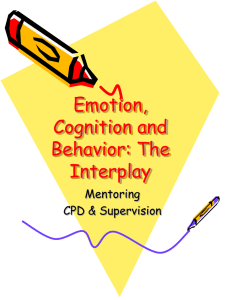Cognitive Approach Evaluation (PPH) 2011
advertisement
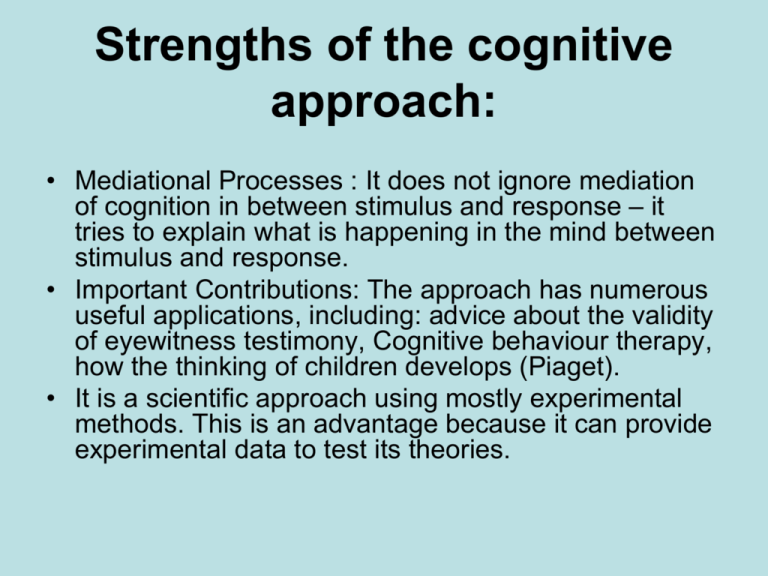
Strengths of the cognitive approach: • Mediational Processes : It does not ignore mediation of cognition in between stimulus and response – it tries to explain what is happening in the mind between stimulus and response. • Important Contributions: The approach has numerous useful applications, including: advice about the validity of eyewitness testimony, Cognitive behaviour therapy, how the thinking of children develops (Piaget). • It is a scientific approach using mostly experimental methods. This is an advantage because it can provide experimental data to test its theories. Explaining Mediational Processes • The approach focuses on Mediational Processes : the processes that happen “inside” the mind. This is a strength COMPARED TO BEHAVIOURISM because Behaviourists ignored what happens in the mind because it is not DIRECTLY MEASURABLE • The cognitive approach tries to explain what is happening in the mind between stimulus and response. • By doing this we understand more about how memory works. Important Contributions • Important Contributions: The approach has numerous useful applications, including: advice about the validity of eyewitness testimony, Rational Emotive therapy, how the thinking of children develops (Piaget). • These are strengths because they provide useful explanations of behaviour and effective ways of dealing with individuals who have problems. Scientific Approach • It is a scientific approach using mostly experimental methods. This is a strength because it can provide experimental data to test its theories, experiments using standardised procedures can be replicated to check for reliability and validity. • A good example is attribution theory – this is supported by experimental data. Strengths of the cognitive approach: In Pairs Write 50 words on why each bullet is a strength • Mediational Processes • Important Contributions • Scientific approach Weaknesses of the cognitive approach: • Nature and Nurture: Despite taking both into account it fails to take into account some biological factors (nature) and cultural influences (nurture) • Determinist Approach: It is deterministic saying we are determined by schemas, although we may have some choice in how to interpret information. • Reductionist: It is reductionist- ignoring the huge complexity of human functioning compared to computer functioning. • Mechanistic: Too cold and mechanistic assuming that all behaviour is the result of rational thought processing. Nature v Nurture • Despite taking both into account it fails to take into account some biological factors (nature) and cultural influences (nurture). • This is a weakness because compared to the Biological Approach it ignores the influence of genes on behaviour eg Bouchard & McGue’s work on IQ. Mechanistic • Machine Reductionism: The approach reduces a human being with feelings and emotions to a “thinking machine”. • This is a weakness because it ignores the role of social and emotional factors in our behaviour. • For example Kelley’s Covariation model suggests that people follow certain rules in making attributions. Many of us are not even aware that we are using rules. Determinist approach: • It is deterministic saying our behaviour is determined by schemas. • Schemas are the result of experience we can’t control (the environment we grow up in) and the social interactions we have as we get older. • This process leads to CULTURAL STEREOTYPES that may determine the way we interpret situations. • This is a weakness because it ignores the individual’s ability to ignore cultural stereotypes. Weaknesses of the cognitive approach: • In Pairs Write 50 words on why each bullet is a weakness Nature and Nurture: Despite taking both into account it fails to take into account some biological factors (nature) and cultural influences (nurture) • Determinist Approach: It is deterministic saying we are determined by schemas, although we may have some choice in how to interpret information. • Mechanistic: Too cold and mechanistic assuming that all behaviour is the result of rational thought processing.

